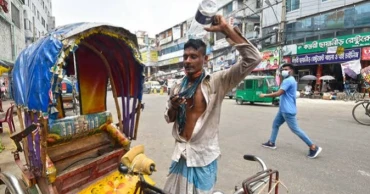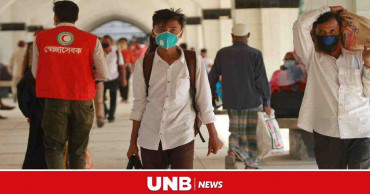Public health experts
Heatwave being considered a ‘disaster’: State Minister for Disaster Management and Relief
With temperatures reaching unbearable levels, there is a call from public health experts and meteorologists to officially declare the heatwave a disaster and to establish a comprehensive action plan to address its impacts. Against this backdrop, the Ministry of Disaster Management and Relief says it is considering the ongoing heatwave in Bangladesh as a “disaster”.
During the current summer season, the country has been experiencing a prolonged period of heat, causing widespread disruption to daily life. Instances of heatstroke have led to fatalities, numerous hospital admissions, and significant damage to crops and fruit trees.
In response to inquiries about whether heatwaves should be declared disaster like droughts, State Minister for Disaster Management and Relief Md. Mohibbur Rahman emphasized, “I certainly would call this extreme heatwave a disaster.”
Dhaka’s air ‘unhealthy for sensitive groups’ this morning
The ministry is actively gathering data on the severity of the heat, which has caused various forms of damage, including deaths from heatstroke, illness, and agricultural losses. This information will guide their decision on whether to extend financial and other forms of assistance to those affected, the state minister said.
Secretary Md. Kamrul Hasan of the Ministry of Disaster Management and Relief stated that while the government last declared lightning a disaster in 2016, the suggestion to categorize heatwaves similarly is under consideration. The ministry is collecting data on the highest temperatures and their impacts to determine the next steps.
Public health expert and former director of Disease Control at Directorate General of Health Services, Professor Dr. Be-Nazir Ahmed, warned that the current extreme temperatures pose a serious health risk, potentially leading to outbreaks of diseases like cholera.
Dr. Ahmed advocated for strategic planning to prevent heatwave-related deaths and suggested that such a strategy should aim to make the heat more tolerable, including increasing vegetation and maintaining water bodies as cooling measures.
Rain expected in Chattogram and Sylhet within 24 hours
Dr. Md. Zillur Rahman, Dean of the Faculty of Earth and Environmental Sciences at Dhaka University, stressed that preparation is crucial as average temperatures have risen by one degree Celsius from 2011 to 2020. He noted that the country is experiencing hotter summers and emphasized the need for strategies to adapt to these increasing temperatures.
According to the Meteorological Department, a heatwave is categorized based on temperature ranges, with the highest category being "severe" when temperatures exceed 42 degrees Celsius.
On April 20, 2024, the country recorded its highest temperature of the season at 42.6 degrees Celsius in Jashore, indicating the severity of the current heatwave. Schools remained closed due to the extreme heat following the Eid holiday break.
The ministry and experts are considering implementing national strategies to mitigate the effects of heatwaves, emphasizing the need for a proactive approach to protect public health and ensure economic stability in the face of increasing temperatures.
Read more: Heatwave forces closure of schools until Thursday
1 year ago
Covid 4th wave begins in clusters in Dhaka, say public health experts urging caution
As the country’s daily Covid-19 cases crossed the 1,000 mark on Wednesday after nearly four months, experts feared that the fourth wave of the pandemic has begun in some clusters in the capital.
They said two Omicron sub-variants--BA.4 and BA.5--are probably fuelling the fresh spike in Covid infections like in some other countries in the world, and warned that coming weeks could see exponential growth in daily Covid-19 cases as the community transmission may begin soon.
Read: COVID vaccines saved 20M lives in 1st year, scientists say
The public health experts, however, think the new wave is unlikely to be as virulent as the previous ones since a very large number of people have some sort of antibodies gained either by infection or vaccination.
DGHS spokesperson Dr Robed Amin, IEDCR adviser Dr M Mushtuq Husain and former World Health Organisation (WHO) Regional Advisor Muzaherul Huq made the observations while talking to UNB.
They emphasised on strict maintaining Covid-19 protocols, including the cent per cent use of masks and ramping up of vaccination to bring the most elderly persons under the coverage of the booster dose of the Covid vaccines to slow down the infection.
Bangladesh recorded 1,319 new cases and one death on Thursday while one death and 1,135 cases on Wednesday.
The country recorded over 1000 Covid cases (1409 cases) with 11 deaths last on February 25.
The daily-case positivity rate jumped to 14.32 per cent from Wednesday’s 13.30 per cent as 9,214 samples were tested, according to the Directorate General of Health Services (DGHS).
3 years ago
Is it safe yet to fly during the pandemic?
Public health experts say staying home is best to keep yourself and others safe from infection. But if you’re thinking about flying for the holidays, you should know what to expect.
5 years ago





